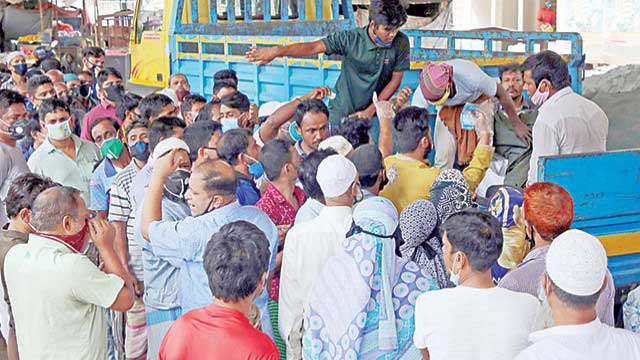Economists fear that the urban poor is heading for food crisis as crowds are swelling at OMS shops in the capital.
Food officials reported an increase in the demand for subsidised rice among the urban poor as they resumed the monthly open market sale of rice in Dhaka last week.
This is the second month the government is holding special OMS for the urban poor selling a kilogram of rice at Tk 10 to the holders of a limited number of ration cards since the coronavirus outbreak.
In May, the first month of special OMS, more than 14 per cent of 46,800 ration card holders in Dhaka city did not show up at truck-mounted government subsidised shops to receive their share of 20 kg rice each.
‘The turnout of the poor is significantly higher this month compared to the last,’ said assistant rationing controller Kamal Hossain.
Dhaka Rationing Office covered 38 of the 129 wards in two Dhaka city corporations since the opening of the 2nd round of OMS Thursday where the ration card holder turnout was nearly 94 per cent.
Initially in May, the missing ration card holders prompted suspicion among food officials that many of the ration cards might have fallen into the wrong hands.
The missing 6 per cent ration card holders still point the finger at potential lack of transparency in the distribution of the cards because many of over four million poor in Dhaka city are in food crisis after losing their livelihoods.
Economist Md Asaduzzaman said that the urban poor headed for an almost certain food crisis as their income is unlikely to return to the pre-epidemic level anytime soon.
‘Spiralling COVID-19 infections will soon push people back to the confinement of their homes,’ Asaduzzaman, professorial fellow at Bangladesh Institute of Development Studies, told New Age.
He suggested that the government should prepare for expanding its food aid to avoid a humanitarian crisis.
Gathering of more people at OMS shops is definitely indicate that they have no enough cash to purchase from a regular rice shop, said senior agricultural economist Jahangir Alam.
‘People are losing their jobs. From where would they get cash? This situation was only expected,’ he said.
Jahangir said that the government should have long term plan in helping urban people with food and other essentials such as oil and sugar.
‘By now many people have run out of their savings and cannot afford to go regular market,’ said Jahangir.
Bangladesh Agricultural University professor emeritus Sattar Mandal said that the real economic impact of COVID-19 on about 2 crore urban poor in the country would take a while to surface.
He said that almost all of them were confused and moved frantically between places with the government frequently turning on and off economic activities.
‘These people are trying to settle in a new life, either trying to return to pre-pandemic situation or to start a fresh life in villages,’ said Sattar.
‘We have to wait to see what becomes of the urban poor at least until the end of June and the government must be ready to stand by their side under any circumstances,’ he said.
Although the government claimed to have increased rice allocations for OMS, in reality the number of beneficiaries remained almost the same as last month.
‘We have reports from the field about the need for increasing the number of beneficiaries and we are working to expand our programme,’ food directorate’s director general Sarwar Mahmud told New Age.
Dhaka rationing office said that their monthly allocation was increased in June as the number of beneficiaries swelled at every ward in both the city corporations in Dhaka.
The number of ration card holders at each ward of Dhaka North City Corporation was asked to be raised to 622 from existing 400, said food officials.
In every ward of Dhaka South City Corporation, the number of ration card holders was supposed to be increased by 160 new card holders, they said. Currently, each DSCC ward has 336 ration card holders.
‘We will not be able to use the increased allocation for we could not issue any new ration cards in June,’ said Kamal.
He said that the city corporations failed to complete the groundwork required for issuing ration cards in nearly a month.
The food directorate said that their OMS programme benefitted 1,259,400 urban poor across the country’s divisional cities, district towns, municipalities and city corporations in May.
It said that the rice OMS allocation was increased to 40,864 tonnes in June from 25,188 tonnes in May.
The government reached 2,043,200 urban poor families through its rice OMS in June on paper but the number of beneficiaries was far less owing to the complexities in the issuance of ration cards.
Before the onset of the coronavirus crisis, anybody could buy rice and flour from government OMS, but not more than five kilograms at a time.
The government set new conditions for running the OMS programme saying that a large amount of its allocation was misappropriated by its dealers in the past.-New Age





